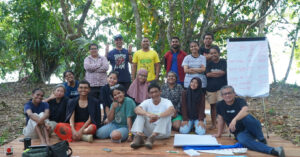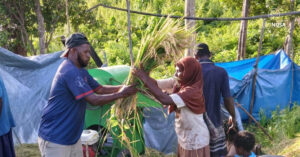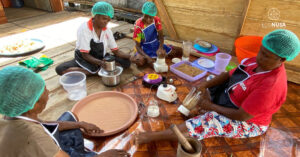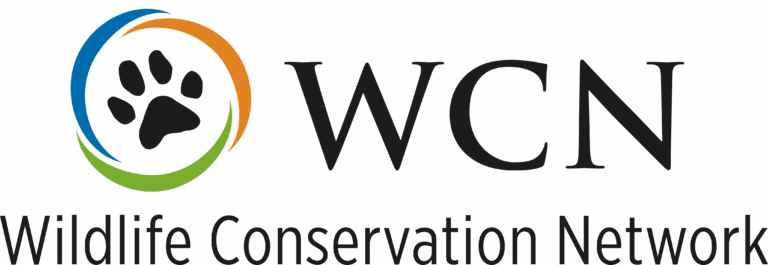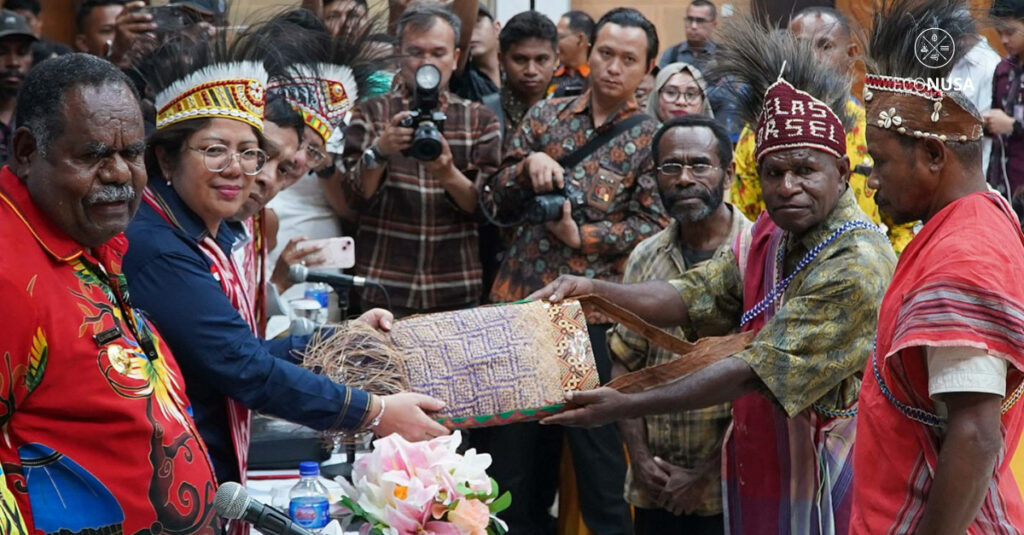
For indigenous Papuans, forests are more than just resources, they are history, life, and the future. That’s why many indigenous communities in Papua are fighting for government recognition of their rights. Among them are the Nakin Onim Fayas and Tehit Mlaqya sub-tribes, who live in Wersar and Tapiri Villages in South Sorong, Southwest Papua.
On Thursday, May 8, 2025, together with representatives from five other sub-tribes from South Sorong, they attended the Working Visit of Committee II of the Regional Representative Council of the Republic of Indonesia (DPD RI) in Sorong. Representatives from the seven sub-tribes submitted documents proposing the recognition of customary forests to Committee II, requesting their support to urge the Ministry of Forestry to issue decrees (SK) formally recognizing these forests. The submission was witnessed by the Governor of Southwest Papua and the Provincial Parliament Chairperson.
“We came here to submit these documents so we can be officially recognized. We have already received decrees recognizing our customary territories from the local government, and we ask the Governor and the DPD to push the Ministry to quickly issue the decrees for our customary forests,” said Adrianus Kemerai, a representative of the Indigenous communities of the seven sub-tribes in South Sorong.
Also Read: Victory! Indigenous Communities Secure Their Ancestral Lands
The seven sub-tribes from South Sorong had received local government recognition of their customary territories in April 2024, through a decree signed by the Regent of South Sorong granting recognition and protection to Indigenous Peoples and their territories. This includes the Tehit Mlaqya and Nakin Onim Fayas sub-tribes, who have been supported by EcoNusa Foundation.
This local recognition was the result of years of collective struggle. Initially, their lands were included in palm oil plantation concessions. After the South Sorong Regent revoked those concessions, the communities worked to gain government recognition of their territories so they could manage their natural resources independently, including protecting the forests within them.
With support from EcoNusa, the Tehit Mlaqya and Nakin Onim Fayas sub-tribes carried out participatory mapping of their customary territories. This process began with territory assessments and participatory mapping training, including documentation of tribal histories and the use of GPS tools. This step was crucial in accurately mapping their forested areas. The training involved various community members and equipped them with the technical skills needed for mapping.
Also Read: 7 Indigenous Territory Recognition Decrees Handed to 7 Clans in Klafyo and Waimon
The process continued with the actual mapping, preparation of key documents such as community agreements on territorial boundaries, detailed records of the consensus on borders, maps signed by tribal leaders and relevant stakeholders, and other supporting documentation. These materials were then submitted to the customary law committee for verification. Only after this lengthy process could the local government issue decrees recognizing Indigenous rights, including their land claims.
Once local recognition was obtained, the communities applied to the Ministry of Forestry for official Customary Forest Decrees (SK Hutan Adat). These decrees would provide legal certainty, support sustainable forest management, and improve community welfare by granting access to manage their customary forests.
“We hope the Tehit Mlaqya and Nakin Onim Fayas sub-tribes will soon receive ministerial decrees so their ancestral lands will be officially recognized by the state, and no one can interfere with or seize the customary rights of the communities,” said Onesimus Ebar, Head of EcoNusa’s South Sorong Office.


